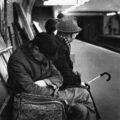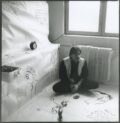Uschi Klein
Abstract
This paper explores photography as a for of cultural resistance during the communist era in Romania (1947–1989) by discussing the works of the following female photographers and visual artists: Hedy Löffler, Geta Brătescu and Clara Spitzer. They worked in the context of one of the most severe dictatorships amongst the nations of the former Soviet bloc. Every aspect of cultural, economic, political, and social life was attentively and exclusively controlled by the regime and the secret police, which was ubiquitous in a society under strict surveillance.
Although photography was practiced and encouraged as a benign form of expression, it was increasingly deprived of
its artistic, social, and documentary power and confined to the realm of amateurism. Stripping photography of its currency enabled the state to maintain control over the camera. Photographers had to be registered members of the regime’s only officially endorsed and financially supported Association of Artist Photographers in Romania (AAFR).
Their photographs were accepted because they seemingly had no social or political implications and sugar-coated ‘socialist reality’, an ideology portraying what life was supposed to look like without documenting the harsh conditions of everyday life during the communist era. Thus, there was a seemingly clear demarcation of photography’s status; artists were discouraged from using photography in their fine art practice, as ‘photographic art’ was only practiced by members of the AAFR. Questioning this separation in relation to gender, this paper frames photography as an ongoing event that is interwoven in webs of power, dialogue, resistance, and agency and involves multiple choices and participants. Drawing on three female artists/photographers, resistance is understood as both opposition and survival, no matter how small these acts of resistance are. Within this framework, female artists/photographers were able to find a space to resist the imposed classifications in subtle ways and take an oblique political stance against the oppressive regime.
Dr Uschi Klein is an early career researcher and lecturer at the University of Brighton, UK. Her current research focuses on photography as a form of cultural resistance in communist Romania (1947–1989), as well as on decolonising the Western photography canon to broaden knowledge by including marginalised and under-represented perspectives. Her recent publications include a chapter in the volume The Camera as Actor (Routledge 2020) and articles in academic journals, including Visual Studies and Visual Communication.

